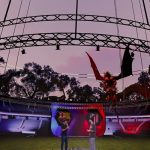YahLive has recently provided its full support to the first panel dedicated to the Arabic TV industry that was conducted as part of MIPTV, the worlds leading international content market and showcase for television and digital entertainment held in Cannes (South of France) from 8-11 April 2013. This came as part of YahLive efforts to […]

YahLive has recently provided its full support to the first panel dedicated to the Arabic TV industry that was conducted as part of MIPTV, the worlds leading international content market and showcase for television and digital entertainment held in Cannes (South of France) from 8-11 April 2013.
This came as part of YahLive efforts to support the advancement of the TV industry in the Arab world, enhance viewership experience and expand the customer service offerings through the latest innovations in the broadcast world comprising HD, 3D and interactive TV.
Mohamed Youssif, CEO of YahLive, said: We are pleased to support the first Arabic TV industry panel focusing on the emerging trend in the Arab world to make use of the latest technologies especially high definition TV (HDTV) and the growing role it is playing. The panel was composed of leading experts in the television industry who gave their valuable insights on how to challenge the existing satellite platforms that are increasingly broadcasting in both standard and high definition to the Middle East audience.
“We believe that the Middle East regions television audience has the right to watch high quality content TV materials provided by encrypted high resolution channels available through a monthly charge and designed to change their viewing experience, he added.
The speakers of the panel The Future of Television in the Middle East included Mohamed Youssif, CEO YahLive, Abu Dhabi, UAE, UAE, Youssef El-Deeb, Director and Producer, founder of Fatafeat Channel, Dubai, UAE, Marwan Helayel, Consultant, Dubai, UAE and Nick Grande, MD, Channel Sculptor, Dubai, UAE.
Topics of discussion included the encryption effects on the Middle East, the piracy concerns and the quality ofengaging content available for quality viewing in the Middle East Region featuring Fatafeet TV as the greatest example in this regard. The panel discussions also highlighted long term goals and stressed on a better viewership experience by enhancing the engagement of the viewers through programs, the ultra high definition technology for a better picture quality (4K) that is coming very fast to the Middle East, the changing Middle East landscape as far as pay-TV is concerned with piracy increasingly being brought under control, the role of pay-TV and HDTV and how they can help increase the return on investment for local producers/broadcasters.
















































































